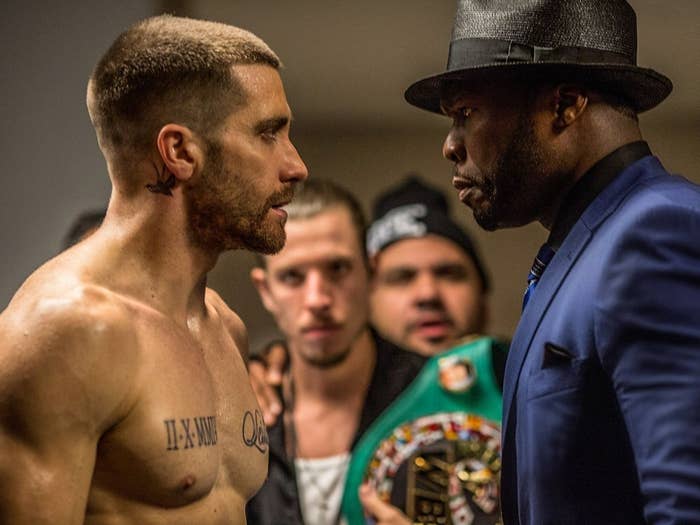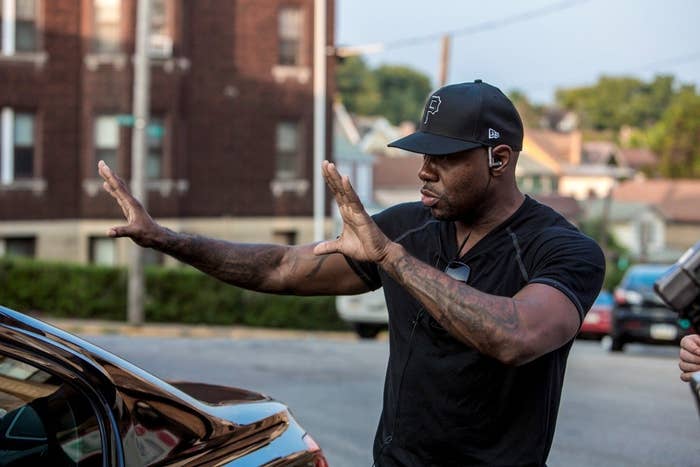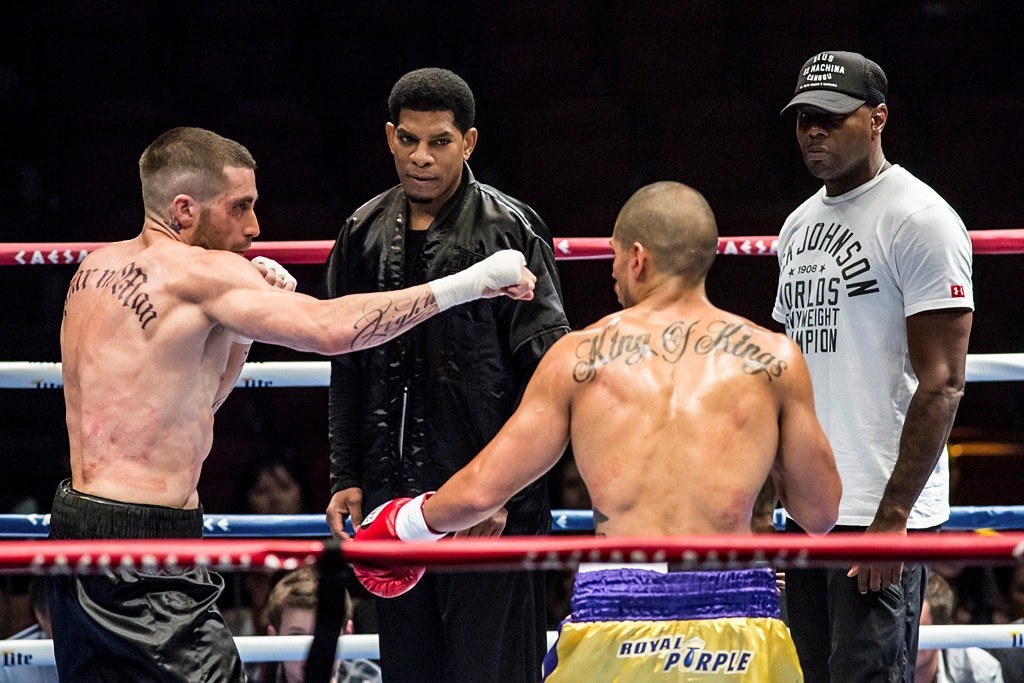
The painful story of urban strife at the center of the new movie Southpaw feels distinctively black, but it's told through the prism of a white lead. The film stars Jake Gyllenhaal as boxer Billy Hope, following him on his rags to riches and back to rags journey in a sport that is largely dominated by brown faces.
It's the type of role that might have felt like business as usual should it have actually been given to a black actor. And that could have gotten into murky, stereotypical territory.
We've seen stories like Billy's before: A kid from the hood — abandoned or orphaned by his parents — grows up in the system and manages to get out and make something of himself despite the odds being stacked against him, as it's happened before in The Blind Side and Annie and with many actual athletes and hip-hop stars. But Southpaw, directed by Antoine Fuqua (Training Day, Brooklyn's Finest), turns that trope on its head with its white leading man (and white leading lady Rachel McAdams; her character is also a product of the system).
So why'd Fuqua decide to make a movie that tells a dramatic story familiar to black audiences from the perspective of a white man?
The director smirked after being asked that question during a recent interview with BuzzFeed News one Sunday afternoon in Beverly Hills. Then, he pulled his smartphone out of his jacket pocket, and leaned in closer while enlarging an image on the screen.
"Look at that," Fuqua said, pointing to a photo of Denzel Washington sitting high on a horse for his upcoming Western. "Magnificent Seven. Who's the lead in that?"
Fuqua dropped his phone back into his pocket, before driving the point he'd made home. "You break tradition sometimes in order to take a genre and flip it on its head a bit, and make it a bit more appealing to all races," he said. "So Jake's going to be the fighter, the lead guy in the role that's the champ, and I'm going to let that fall on him. And then Denzel's going to be the lead for Magnificent Seven. He's going to be Yul Brynner, the Steve McQueen, the John Wayne. We're going to have our version of that."

Fuqua is currently shooting the remake of the 1960 movie that starred Brynner, McQueen, and Eli Wallach. It won't hit theaters for another year, but it ties in with what the director hopes to achieve with Southpaw and his body of work as a whole. The race of the characters in his films is something that he's always conscious of. He wants to make movies that appeal to a mass market, and he doesn't want to be considered a black filmmaker who makes films solely for black audiences.
"I had a conversation with T.I. once, and he got a call to do this particular TV show, and he's like, Man, I don't want to do that, Antoine, because that's just stereotyping me. I already know how to be a rapper. I want to be a lawyer in the show. And I was like, There you go! He was like, How come I can't be the lawyer or accountant in the show?" Fuqua said, recounting his conversation with the rapper turned actor. "That's the point. Otherwise, you're always going to be seen that way. As a director, if I would have just made [Billy in Southpaw] a black lead, then what? I only make black movies and tell black stories? It puts you in a box, and the best thing we can do is break out of the box, but keep opportunity for everybody."
Even still, Fuqua actually did consider a black actor in the lead role after Eminem, for whom Southpaw was conceived, dropped out in order to focus on his music. The movie was written from the perspective of a white guy who had a tight connection with black culture, but Fuqua expanded his options. "I was like, Well, who's going to do it? Michael B. [Jordan] is doing Creed. Jamie Foxx and me had a long conversation about it, and I think he was trying to do the [Mike] Tyson story. Will [Smith] had already done Ali. I was like, Well, let's just stick to what was written and roll with that."
And then Fuqua found Gyllenhaal, who, the director said, brought Billy Hope to life in a way that exceeded his wildest dreams.

"I'm not sure it would have been the same film if [Eminem] did it," 50 Cent, who appears in Southpaw alongside Gyllenhaal, McAdams, Forest Whitaker, Naomie Harris, Rita Ora, and real-life boxer Victor Ortiz, told BuzzFeed News. "Even he says it. He called me. He said, 'Jake. Man, what the fuck? Y'all killed it!'"
A large part of why Gyllenhaal's character feels so urban is because of the Eminem factor: A white kid growing up in or near the big city (in his case, Detroit) finds solace in the black community and invests in it, à la the rapper's semi-autobiographical 2002 pic, 8 Mile.
"You have to look at the significance in our culture, the growth. And then look at people with limited thinking saying that they wouldn't accept it if it was just black music. And then when you find a white guy that grew up in our culture, that has the same passion that we have for it, and he's able to allow people to go, 'Yeah, yeah. I like hip-hop,'" 50 Cent said. "[Some people] would point and say that he is selling records because he's white, but you also have to point and credit him towards our cultural growth. It grew faster because of Eminem. That's why now hip-hop culture is pop culture and you can spin the globe and wherever you stop, there's someone there choosing it as their choice or genre of music."
50 Cent's assertion goes hand-in-hand with Fuqua's point. In Southpaw, the director managed to create a black movie without it ever being marketed or looked at as such. With Gyllenhaal as the lead, the film will appeal to a global audience and won't be up against the challenge that it might have faced had Fuqua gone in a different direction with an actor of color.
"Because that's limited," the director said. "It doesn't go around the world then, and we need it to go around the world. And that means no power, no money. It needs to be worldly, international, broader. That's the most important thing we can do."
